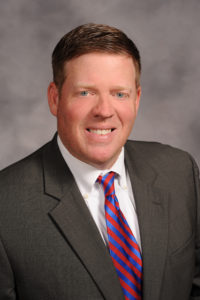We have finally reached June and you know what that means: The Oklahoma legislature has gone home and we can all enjoy the summer.
Unfortuna

tely, it isn’t the case this year. The regular session did adjourn on May 26, but the special session has yet to adjourn.
Early in May, the legislature started a special session to run concurrently with the regular session. The reason was to handle all the bills directly related to the budget.
A special session has to be topic-specific and can’t hear legislation not directly tied to the reason for the special session. The legislature did this for one reason and one reason only: It would allow them to come back this month to do veto overrides should the governor veto any part of the budget.
At the beginning of June, the governor vetoed two bills that are part of the budget package, having to do with tobacco sales and tribal compacts. The legislature designated June 12 to return for veto override votes should they choose to do so.
This is normally the issue of Oklahoma Banker I do a postsession wrap-up on how our legislation went this session. It would be a little premature to do it right now, t hough, as we have several bills that are sitting on the governor’s desk waiting for his actions.
• • •
Now that the debt ceiling has been raised, Washington, D.C., can hopefully get back to normal, whatever passes for normal nowadays. There are several pieces of legislation on our plate this summer – some are good and some are bad.
Below are a couple of this issues we are working on, although we still have all the usual regulatory battles in addition to the legislation.
ACRE
H.R. 3139 is The Access to Credit for our Rural Economy Act, also known as ACRE. This act will help sustain and grow rural America by making it easier for farmers, ranchers and rural homeowners to access low-cost credit.
ACRE will do the following:
Lower the cost of making a loan backed by agricultural real estate, thereby increasing community bank participation in the rural real estate market.
Enhance competition between lenders for agricultural and rural housing loans, lowering the cost of credit for rural borrowers.
Help expand access to local credit in rural America by enabling more community banks to make agricultural real estate and rural home loans.
ACRE excludes from gross income the interest received by a qualified lender on all loans secured by farm real estate and aquaculture facilities. Additionally, ACRE would exclude from gross income the interest received by a qualified lender on home mortgage loans of $750,000 or less in rural communities of no more than 2,500 people.
This tax exemption for interest-income on agricultural loans has been an effective tool to support rural lending by government-sponsored enterprises, and ACRE would simply expand that tax treatment to all federally-insured banks, thereby increasing loan supply and decreasing costs for borrowers.
The “Fair Access to Banking” Act
This act was introduced by Rep. Andy Barr (R-Ky.) on April 20. The bill is being pushed by the National Shooting Sports Foundation.
Barr’s ‘Fair Access to Banking’ bill is to ensure financial service providers aren’t discriminating against lawful industries like the firearm industry to score points with the “woke” cancel culture.
his legislation will supposedly ensure financial institutions, when deciding whether or not to offer services to fully legal and lawful businesses, make such decisions based upon verifiable financial data and not on the political or social views of bank executives.
NSSF also noted “the bill was introduced immediately after NSSF’s fly-in with firearm industry executives meeting with congressional lawmakers.”
As a reminder, The “Fair Access to Banking Act” would:
Require banks with more than $100 billion in total consolidated assets to provide fair access to bank services, capital and credit.
Require covered banks to “provide written justification for why it is denying a person financial services to avoid ambiguity.”
Ensure banks are “not basing their denial of service solely on reputational risk.“
The proposal would prohibit those banks from using discount window lending programs and would terminate their status as an insured depositary institution, with FDIC backing, if they refuse business with any individual.
Barr’s bill currently has 41 cosponsors and is a companion bill to one introduced in the Senate by Sen. Kevin Cramer (R-N.D.)
SAFE Banking Act
A bipartisan group of lawmakers has reintroduced the SAFE Banking Act. The bill, which has passed the House several times, was introduced by Sen. Jeff Merkley (D-Ore.) and Sen. Steve Daines (R-Mt.) and Representatives Dave Joyce (R-Ohio) and Earl Blumenauer (D-Ore.). This is the first time this bill has been introduced in the Senate, so, hopefully, with bipartisan lawmakers, the bill will finally get some movement.
Senate Banking Chair Sherrod Brown (D-Ohio) told us a couple of months ago at the ABA GR Summit he felt this issue would be advanced this year.
• • •
As you can see, this is just a few of the issues your industry is facing in Washington. As I said earlier, it doesn’t include what our regulatory agencies are working on.
It’s going to be a busy summer and we are going to need our bankers to get involved as it’s vital for lawmakers to hear from you in their districts.
We also need you to go with us to Washington in the fall – the dates for our annual visit are Sept. 24-26. We hope to take 100 bankers with us this year and it’s vital to our success we have as many people go as possible.
As you know it’s a numbers game: The more folks we have, the bigger the influence. So, if you aren’t able to attend, please consider sending someone from your bank to join us.
 Oklahoma Bankers Association We make bankers better!
Oklahoma Bankers Association We make bankers better!
